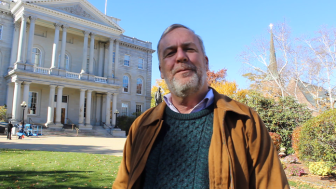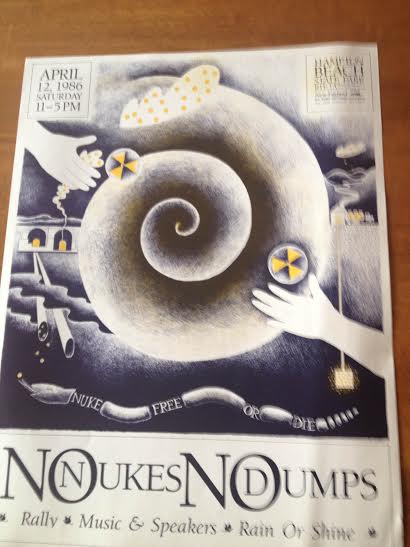
File photo
Rep. Renee Cushing, D-Hampton.
Legislation to reinstate the law that prohibited siting a high-level radioactive waste dump in New Hampshire failed in the House on Thursday.
The House voted 171 to 145 to kill state Rep. Renee Cushing’s House Bill 1622.
It would have reinstated the 1986 High-Level Radioactive Waste Act that banned nuclear waste burial in New Hampshire, which had been repealed in 2011 without a hearing, paper trail or anyone noticing.
Cushing’s bill would have also required the Seabrook Station nuclear power plant to pay millions of dollars to the state annually for storing spent radioactive waste onsite in dry casks.
“This is an open invitation to the Department of Energy to again consider our state’s granite to host the toxic spent fuel from the nation’s nuclear reactors,” said Cushing, a Hampton Democrat and longtime anti-nuclear activist.
State Rep. Herbert Vadney, R-Meredith, spoke against Cushing’s bill arguing it was simply a way people opposed to nuclear power to penalize Seabrook by taxing it for storing spent fuel.
“It’s not necessary,” Vadney said of the bill. “There is pretty much zero chance the feds are going to try to store nuclear waste in New Hampshire.”
Cushing recalled the public outrage in 1985 when the U.S. Department of Energy designated New Hampshire as one of a dozen eastern states under consideration for a nuclear waste dump because of its stable granite, especially around the town of Hillsborough.
Voters in 130 towns the following year approved nonbinding resolutions at town meetings opposing siting a nuclear waste dump here, he said. The Legislature passed the High-Level Radioactive Waste Act that year as well amid much support.
Cushing found out by accident that it had been repealed in 2011 while working on a bill for this session to force Seabrook to pay for storing waste in dry casks. He quickly rewrote HB 1622 to include reinstating the 1986 law.
“What concerns me is the U.S. Department of Energy just recently opened a new round of hearings where it is looking for collaboration for host sites for nuclear waste dumps,” Cushing said.
In 30 years, the federal government has yet to find a location willing to store the nation’s high-level radioactive waste underground.
“Because New Hampshire has reversed its historical opposition to hosting radioactive waste, I’m afraid New Hampshire might once again be targeted,” Cushing said.
Vadney, who serves on the House Science, Technology and Energy Committee, said some people, including Cushing, just want to stop nuclear power.
“People who despise nuclear power want it gone. They want it shut down in New Hampshire. They don’t like Seabrook,” Vadney said. “Rep. Cushing is very dead set against it.”
The bill’s fiscal note said Seabrook would be required to pay the state $500,000 a year for every dry cask of spent fuel it stores onsite, estimating Seabrook would pay $3 million for six dry casks.
Vadney said it turned out that Seabrook is already storing 16 casks of spent radioactive waste, which would have required a $7 million annual payment.
“That would get passed on to the consumer,” Vadney said.
Seabrook has been forced to store the spent fuel onsite because the federal government still hasn’t come up with a solution to permanent storage nationwide, Vadney said. “The federal government seems incapable of coming up with a solution,” Vadney said.
Vadney said President Reagan abandoned an eastern state solution to the storage problem years ago, and President Obama will only allow siting a dump site with collaborating states.
Vadney said he doesn’t know who added the repeal sentence to the state budget in 2011. He hadn’t been elected yet.
It stated simply: “224:120 Repeal. RSA 125-G, relative to the high-level radioactive waste act, is repealed.”
Cushing said he has done some research on who submitted the repeal wording, but has been unable to find out.
“No one has taken responsibility,” Cushing said. “It remains a mystery.”
For previous InDepthNH.org stories that were also published in the New Hampshire Business Review, click below on the following headlines:
1986 Law Prohibiting Burial of Nuclear Waste in NH Quietly Repealed in 2011
A Nuclear Waste Dump Is Just A Long Ago Memory For The Daleys of Hillsborough





